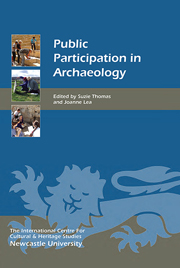Book contents
- Frontmatter
- Dedication
- Contents
- List of Illustrations
- Acknowledgments
- List of Abbreviations
- Preface
- Introduction
- Public Participation in Archaeology: International Models
- Public Participation in Archaeology Through Education
- Public Participation in Archaeology Through Tourism
- Public Participation in Archaeology Through Site Management and conservation
- 13 ‘They are hiding it … Why do they hide it? From whom, and for whom?’ Community Heritage at Work in the Post-Colonial Context of Jordan
- 14 Site Management in Turkey
- 15 Adopt a Monument: Social Meaning from Community Archaeology
- 16 Public Archaeology in canada
- List of Contributors
- Index
13 - ‘They are hiding it … Why do they hide it? From whom, and for whom?’ Community Heritage at Work in the Post-Colonial Context of Jordan
from Public Participation in Archaeology Through Site Management and conservation
Published online by Cambridge University Press: 05 August 2014
- Frontmatter
- Dedication
- Contents
- List of Illustrations
- Acknowledgments
- List of Abbreviations
- Preface
- Introduction
- Public Participation in Archaeology: International Models
- Public Participation in Archaeology Through Education
- Public Participation in Archaeology Through Tourism
- Public Participation in Archaeology Through Site Management and conservation
- 13 ‘They are hiding it … Why do they hide it? From whom, and for whom?’ Community Heritage at Work in the Post-Colonial Context of Jordan
- 14 Site Management in Turkey
- 15 Adopt a Monument: Social Meaning from Community Archaeology
- 16 Public Archaeology in canada
- List of Contributors
- Index
Summary
Introduction
Within the context of Jordan, the term ‘heritage’ is verbally and mentally more approachable for lay people than the term ‘archaeology’. Thus, in this chapter, community heritage is used interchangeably with community archaeology to describe a discipline that explores people's engagement with material of the past. Basically, community archaeology ‘create[s] an open, participatory and rational-critical debate, which is presumably the only way to integrate public opinions into decisions about archaeology’ (Matsuda 2004, 66). This critical engagement with contemporary issues, using a participatory approach, enhances archaeological theories and practices related to heritage management, given that ‘archaeological theory falls short in addressing heritage management and how archaeological knowledge is used within the management process’ (Smith 1994, 300).
This chapter is about establishing engagement with people in Jordan regarding archaeological sites. The respondents in the study supplied data through in-depth interviews about certain archaeological sites that exist within their living or working environments. The interviews focused on the respondents’ opinions of the interventions carried out within the sites in question. Their accounts are then incorporated with community archaeology literature that is, basically, produced in Western academic contexts. Thus, the study places the theoretical framework provided by the literature within a practical perspective influenced by the Jordanian setting. This should support the respondents’ accounts and make them eligible to be part of the archaeological knowledge that can be used in the management process, as Smith (1994, 300) observes.
- Type
- Chapter
- Information
- Public Participation in Archaeology , pp. 149 - 160Publisher: Boydell & BrewerPrint publication year: 2014



